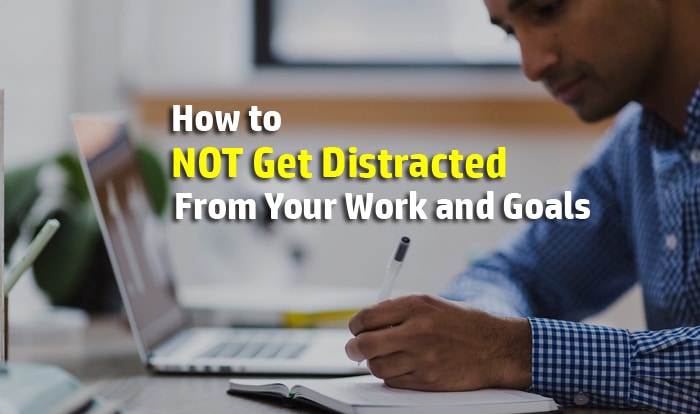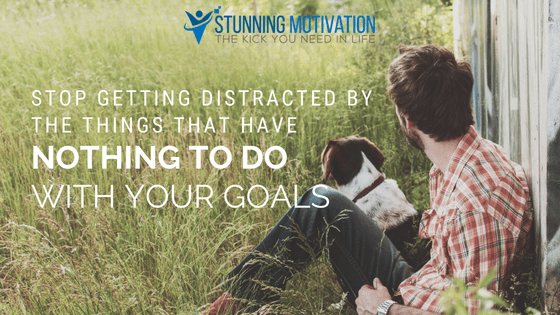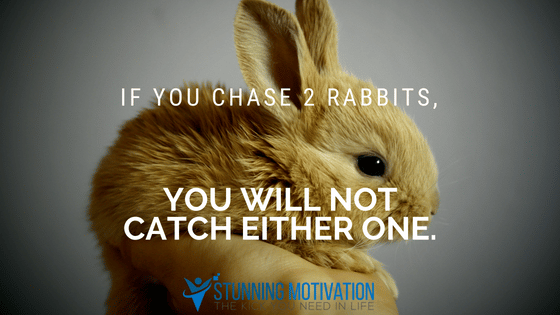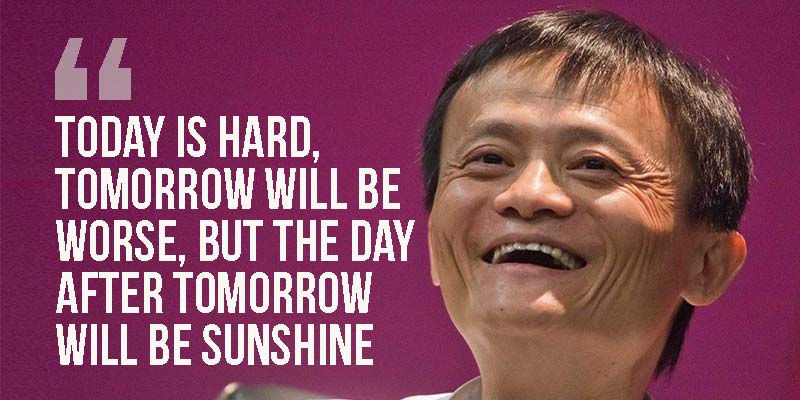No matter how good you are or how focused you can be, there is no way you can NOT get distracted from doing your work or achieving your goals. We’re human beings and getting distracted is something natural in us.
The key then to staying productive and to getting things done is to learn how to manage ourselves and thoughts better.
We can’t manage our time. No matter how good we are, we only have 24 hours a day. And it is what we do during those 24 hours that will determine how effective we can be.
And if you are looking for ways how to NOT get distracted from your goals or from your work, you are reading the right article.
Below are the 10 amazing ways you can apply, practice, and make use in your daily life to focus better on your goals, to help you get rid of distractions, and to get your work done. Check them out.
1. Remind, review, and measure your goals, every day
Use the R-R-M technique, which stands for, Remind, Review, and Measure.
Every day, you must do something to remind yourself of your goals. This is why vision boards work. Whenever you see your vision boards, you remind yourself of your goals and what you need to do to achieve them.
Writing down your goals on a daily basis works too. The key is to constantly program your goals and the things that you want to achieve into your subconscious mind.
Remember, you are what you think about most of the time. And whatever that is out of your sight, will be out of your mind. So make your goals visible to you.
Next, review your goals. Make sure what you do each day are getting you closer to your goals.
More importantly, create a measurement system to track your goals. You want to make your goals measurable so that you can tell if you are moving forward or backward.
According to Peter Drucker, the famous management consultant, whatever you measure and track, you can manage and improve.
So, how do you measure and track your goals? First, evaluate your goals. And then create a system to measure and track them.
Read this article from BufferApp and learn: How to Measure Progress in Your Personal Goals: Daily, Weekly, and Monthly
2. Focus on your wildly important goal
I bet you know that focus is important and that if you want to produce the best result, you should focus on doing just one thing at a time, right?
The problem is that most people have too many goals. They spread themselves too thin by paying attention to so many goals at the same time.
You see, it is good to have 100 goals, but if you are serious about achieving them, you must not spread yourself all over them.
What you need to do is to focus on your wildly important goal, which is the goal that impacts your life the most.
Focus on just one goal that is the most important to you right now. A goal that will affect and change your life the most.
Identify this goal and focus on it, with 100% attention.
I learned this principle from the famous book, The 4 Disciplines of Execution. It is one of the best books on goal setting that I strongly recommend you read.
Read my previous article, How to Stay Focused on Your Goals, and you will understand why Warren Buffett suggested his personal pilot focus on just 5 goals and ignore the rest.
Focus is power, my friend. More is not always better.
It is better to accomplish 1 or 2 goals rather than having 20 goals but accomplishes none of them, right?
Having too many goals, distract you from your main goal.
3. Schedule your actions and tasks
Schedule works. Don’t just say that you want to exercise because you want to lose weight. Instead, be specific and schedule your exercise.
According to studies, when people state their schedule like when and where they are doing to do something, the chances of them doing the work increased dramatically:
- Women who stated when and where they would perform a breast self–examination, did it 100% of the time. Meanwhile, those who didn’t state when and where only performed the exam 53% of the time.
- Dieters who formulated a plan for when and how they would eat healthier were significantly more likely to eat healthy than those who did not.
- People who wrote down when and where they would take their vitamins each day were less likely to miss a day over a five-week span than those who did not.
Now you get it, so turn your actions and tasks into your schedules. Clearly state the work that you want to get done.
Here are some examples:
Don’t say – “I’m going to exercise 2 times this week.”
Say – “I’m going to exercise for 30 minutes in the gym this Tuesday and Friday at 6PM.”
Don’t say – “I’m going to write and publish an article to my blog.”
Say – “I’m going to write a 1,000 words article today at 8PM and I’m going to publish it on my blog before 10PM.”
The more specific you are, the more likely you are going to stick to your schedule.
This is how you can use the power of a schedule and stay focused on your goals. Of course, it is also a good way to avoid being distracted too.
4. Build a conducive atmosphere and a supportive environment
This is a big one when it comes to staying focused and getting away from distractions. Your environment plays a vital role, my friend.
Imagine if you have to write an article in a busy location like in the wet market, can you focus properly? You can’t.
The atmosphere and the environment can work FOR you or AGAINST you.
Create a dedicated workplace. Build a bunker by closing your room’s door. Put up a “Do not disturb” sign. If you are working in a cubicle, put on your headphone. It is alright even if you are not listening to any music, it is just a way to avoid others from distracting you.
In order to allow yourself to focus on your goals, make sure you mix with people who are positive and who will encourage you to achieve what you want.
Don’t mix with negative people and who will talk you out of your goals. Remember, your environment plays an important role in shaping you.
Read my previous post:
10 Tips How to Change Your Environment for Greater Motivation
5. Remove all possible external distractions
Yes, besides creating a conducive and supportive environment, you must also remove all possible external distractions.
Well, one of the biggest is your phone. Silent it, put it in the drawer, and get it out of your mind when you work on your goals.
You want to make sure that when you work, you can work with 100% concentration so that you can get the most from your time. You don’t want to be distracted by other stuff like your email notifications.
Another big thing to understand is that you must get rid of the temptations that will make you procrastinate.
For instance, if you want to lose weight and decided to cut down your calories intake, don’t visit the dessert bar.
Once you have decided on a goal, make sure you are able to focus fully and work on it with all your attention.
Don’t go and attend a workshop that is not going to help you in achieving your goals. Exposing yourself to all other opportunities is not a good way to focus.
In fact, you can get distracted by other things, you can abandon your goals, and before you know it, you have started another new project or pursue something new.
Thus, remove all possible external distractions.
6. Work on only one thing at a time
Read this best-selling book, The One Thing, written by Gary Keller. And you will understand why it is extremely important to NOT multitask, but to focus on doing just one thing at a time.
We are not hard-wired to multitask. This is especially true for work that requires your attention.
When I write articles like this one, usually, I will put on some background music (without lyric) to help me write better.
However, when I play songs (with lyric) on the background, I can’t focus. My mind will want to sing along.
This is why multitasking doesn’t work. Try to text someone as you drive. You will put your lives and others at risk.
Or try to read a book and talk to someone at the same time. You will find that you can’t do both at the same time.
This is because your mind can only focus on doing just one thing at a time.
And in order to NOT get distracted, you must not multitask. Choose to do just one thing at a time.
This is why you should focus on just 1 or 2 wildly important goals, not 10 or 100 goals at the same time.
Plus, you don’t want to have 20 or 30 items on your to-do list. Having so many tasks to work on will only make you exhausted mentally.
Choose to focus on the vital few. Come up with only 3 to 6 important tasks to work on each day.
If you have a to-do list but you are having a hard time completing your tasks, read this:
10 Super Tips How to Create an Effective To-Do List
7. Keep your energy and willpower high
There is no way you can have 100% concentration and focus 24/7. Your energy will fade and so with your willpower.
And when this happens, your chances to procrastinate increase. Your brain will find something else more ‘fun’ to do rather than focusing on doing your work.
Hence, what you need to do is to maintain and keep your energy and willpower high.
The best way to do this is to take breaks. Use the Pomodoro Technique and schedule breaks into your days, weeks, and even months.
Besides that, make sure you eat healthy foods that give your physical body the energy that you require to work on your day.
When you put in junk food, you feel tired and hard to focus.
Here are some tips to help you maintain your energy better during your day:
- Take enough sleep – at least 8 hours a night
- Eat nutritious and healthy food
- Go outside and get close to nature
- Exercise regularly
- Take power naps when necessary
- Slow down and practice deep breathing
If you want to learn how to increase your energy and productivity throughout the day, read this article from Willpowered.co.
8. Use creative procrastination
Procrastination is good if you do it at the right time. Like I said above, there is no way we can stay productive and focus on our work 24/7.
No matter how zen you are, there are times when you will feel tired and just want to do something else.
And this is when creative procrastination can help. You procrastinate with a purpose – to recharge yourself and regain your energy.
You want to rejuvenate yourself so that you can have more energy to continue on.
This is why scheduling breaks into your workday is important. And this explains why recess at school is vital too.
In fact, taking breaks can save lives too, read this article from the New York Times.
The article also said:
“The more choices you make throughout the day, the harder each one becomes for your brain, and eventually it looks for shortcuts, usually in either of two very different ways.
One shortcut is to become reckless: to act impulsively instead of expending the energy to first think through the consequences. (Sure, tweet that photo! What could go wrong?) The other shortcut is the ultimate energy saver: do nothing.”
So avoid decision fatigue, take more breaks, and procrastinate creatively and purposefully.
9. Just start right away and start small
If you want to not get distracted, you just need to start right away. Don’t think. Don’t give yourself time to think or choose what to do.
Just dive straight in and take action.
First, you don’t want to give yourself to think if you CAN procrastinate or not. Next, you want to start the progress to build up the momentum.
The key is to just get it started so that you will build up the inertia.
If you need to write a 1,000-word article and you don’t feel like doing it, just start and commit to doing the minimum, say 100 words or the first paragraph.
Commit to taking the minimum action to build up your motivation. When you get it started, your mood will change, and the motivation will come.
This is why the One-Minute Rule works.
10. Make your work a routine
The best way to overcome distractions is to make your work a routine. So this way, distractions can’t get through to get your attention away.
When an action becomes your habit, you will never miss it. Not even distraction can take your attention away.
Even if you do really get distracted, you will get back to your work after that because a habit that is deeply rooted will put things into the automatic mode.
Therefore, learn to build good habits. Transform your daily actions into your routine.
The good news is that you don’t have to build many small habits, you just need to focus on the vital few that will greatly affect your life. You need to build keystone habits.
Read: What Are Keystone Habits and the 7 Most Common Examples
When you develop a keystone habit, you make developing other habits easier.
For example, when you make it a habit to do yoga for 30 minutes a day, you become more focused, you procrastinate less, you eat more healthy, and you sleep earlier.
In this case, practicing yoga (keystone habit) for 30 minutes a day has improved and made other habits (more focused, procrastinate less, eat healthily, and sleep earlier) easier to develop.
So identify what is the keystone habit that you can develop that can help you get rid of distractions and make you more focused on your goals.
Conclusion
Avoiding 100% distractions is not possible. Distractions exist and they will be there no matter what you do.
However, that doesn’t mean that you should let your life run freely without control. So choose to manage your life properly.
If you want to live a good life, achieve your goals, and live your dreams, you must start by avoiding what takes your attention away from what you want.
This is why self-management is important.
First, you start by learning how not to get distracted using these 10 methods:
1. Remind, review, and measure your goals, every day
2. Focus on your wildly important goal
3. Schedule your actions and tasks
4. Build a conducive atmosphere and a supportive environment
5. Remove all possible external distractions
6. Work on only one thing at a time
7. Keep your energy and willpower high
8. Use creative procrastination
9. Just start right away and start small
10. Make your work a routine









